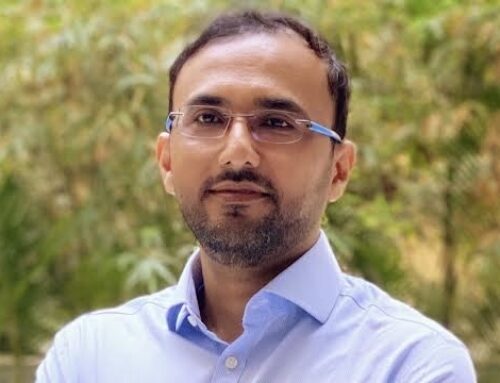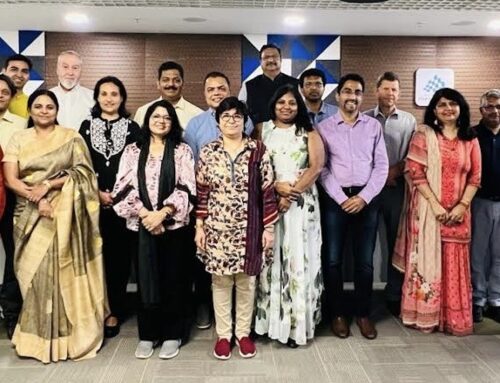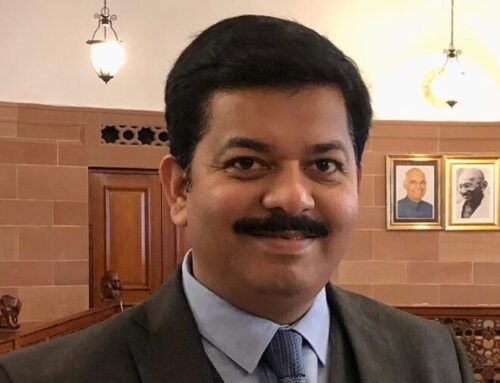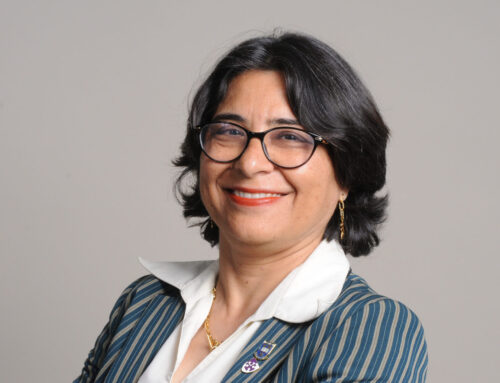John Hoffmire: I hope you don’t mind my starting out on a somewhat personal note by saying I remember you as one of the nicest people I have ever met. I’ve often wondered how you balance your kindness and positive attitude against the sometimes hard edge that is expected in the business management world.
Mohita: In describing the life that we working women lead, especially the work-life balance for the working women, I’ve often used the analogy of flying a kite. I love the beautiful festival of ‘Uttarayan’, which represents the dawn of positivity, and the meaningful lessons to be learned from kites.
The kite always dreams to fly high and enjoy the vastness of the sky. But it is connected through a tenacious, sharp, and tension-filled colorful manja — the string that is attached. That string is support for the kite to fly.
For us to fly freely and contribute meaningfully to the society at large with a purpose, we have to be light in “being” and thoughts; and not carry too much baggage around. We also need a nimble and resilient attitude, which can adjust to the winds of circumstances, opportunity, and opposition. This allows us to change our trajectory while nevertheless continuing to fly on the winds of support and opportunities.
But equally as important as all of this is that opposition – the pull, tension, and sometimes abrasive interjection of the manja or string – is essential for the kite to fly. I guess that is how I see the challenges that face women in India and, indeed, throughout the world, as the tension of the kite string is essential to make us fly. That said, it isn’t easy or comfortable to have to deal with the tension professionally or otherwise. But with the right attitude and fortitude, it can be the driving force that helps you fly. That truly represents my philosophy towards my profession and life.
John: I might add that you are a prolific researcher and writer and have published dozens of articles and case studies for international journals and several prominent business schools, including Harvard. For that matter, you came to Oxford. Tell me about what it meant to you to be a part of the Chevening Research Science and Innovation Leadership Program (CRISP).
Mohita: The very first day of my CRISP experience will remain etched in my memory forever. I was a student once again – this time at Oxford University. All my course mates were experts in their respective fields. What we managed to do together is what, to me, defines the success of this program. The CRISP fellowship was a journey of creating meaningful dialogue between interdisciplinary participants. It helped us mid-career professionals break boundaries and enabled us to think laterally. It gave us wider perspectives to various problems and the world at large.
We went armed with our own diverse experiences across various sectors – education, technology and innovation — and the fellowship opened more avenues for us by honing our current skills and yet prompting us to go beyond our comfort zones. Besides the great campus life with cultural inclusion, we also had access to great facilities, including the libraries. Special lectures and events also added to our campus life, which helped us gain more insight into British culture.
New professional and personal experiences, developing great friendships and connections were just one part of our time as CRISP fellows. Our exposure to diverse world-views while interacting with other fellows and like-minded teachers also helped us delve deeper into the challenges and complexities of the world.
Given a chance, I would love to relive my CRISP experience again. A former CRISP fellow introduced me to the program. I would encourage other mid-career professionals to consider the program as an important tool to widen their perspectives as well as learn from the masters in the sphere of innovation.
John: I’m so glad I met you as a CRISP fellow and it has been such fun to reconnect and learn about your work and your positive view of the challenges women face in the workforce. I wish you every continued success and smooth winds to soar high for your kite flying.
Mohita: Thank you, John. You and Richard are part of what makes the CRISP program so outstanding. I learned so much from you both.
Read the entire interview here at The Center on Business and Poverty
Dr. Mohita Gangwar Sharma is a professor of Quantitative Techniques and Operations Management at the FORE School of Management, New Delhi. She is also an alum of the Chevening Research Science and Innovation Leadership Fellowship (CRISP) program at Oxford University (2016)
Interviewer: Dr. John Hoffmire is the Chairman of the Center on Business and Poverty, and Research Associate at the Oxford Centre for Mutual and Co-owned Business





